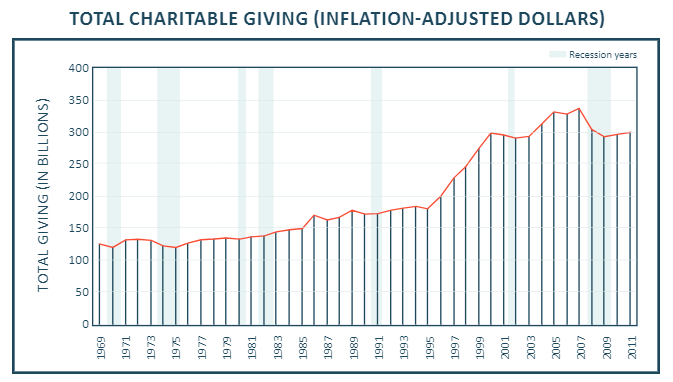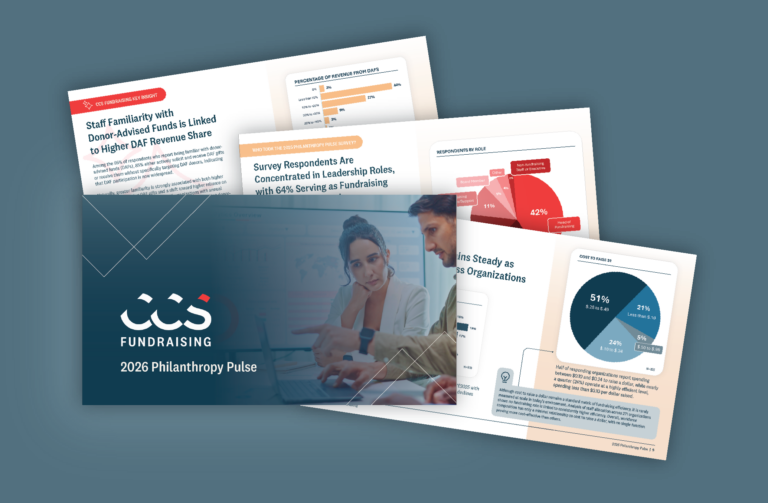Ten years ago, the U.S. economy was in the depths of the most devastating economic downturn since the Great Depression. The impact was substantial and wide-spread: 8.8 million people lost their jobs, GDP fell more than 4%, and home prices deteriorated by 30%. At the same time, Americans collectively gave less to charities than they had since the 1990s.
Today: the economy has been growing for the past ten years and in 2018 philanthropic giving reached an all-time high, surpassing $427 billion. While the Great Recession may now feel far in the past, there has never been a more pertinent moment for nonprofits to consider what lessons could be learned. With many economists predicting an impending economic downturn, it is crucial to consider how recessions impact philanthropy and what charities can do to best weather a storm.
What are economists predicting?
In recent months, there has been increasing speculation that an economic downturn is coming. A survey by Duke University Fuqua School of Business shows that 82% of US CFOs believe a recession will have begun by the end of 2020. With strong memories of the Great Recession firmly fixed in the minds of Americans, there is no doubt that signs of an impending downturn have stirred anxiety in nonprofit leaders who rely on philanthropic support to operate. But there is no need to approach the future with uncertainty. Understanding how recessions have impacted charities in the past can shine light on what to expect and, more importantly, what to do now to prepare.
How did the Great Recession impact giving?
The immense generosity of Americans has stayed fairly consistent through good and bad times. According to the five-year CAF World Giving Index, the U.S. ranks second among all countries in giving behavior, with 62% of respondents indicating they donate to charity. Furthermore, in four of the seven recessions highlighted by The Stanford Center on Poverty and Inequality, seen in the chart below, giving continued to increase, albeit sometimes at a slower rate than in non-recession years.

Figure – Russell Sage Foundation and The Stanford Center on Poverty and Inequality: Charitable Giving and the Great Recession
However, despite the resiliency of Americans during tough economic times, the Great Recession’s deep and widespread impact left many people giving less. Giving decreased by 3.7% in 2008 and then 8.3% in 2009. Much of this drop can be attributed to declines in giving by the wealthiest Americans. As reported by the New York Times, from 2006 to 2014, “[t]he share of income donated to charity by Americans who earned $200,000 or more decreased by 4.6 percent.”
While these decreases surely impacted many nonprofits, it is important to note that the decline was short-lived and did not impact everyone. According to the Center for High Impact Philanthropy at The University of Pennsylvania, “[a]s our economy has bounced back from the recession, so has philanthropy, and at a much faster rate than experts predicted: giving in 2014 rose to $358.4 billion, surpassing pre-recession rates.” Further, some charities actually performed better in the recession. Nonprofits who address poverty-related causes were often targeted by philanthropists who saw increased need for services throughout their communities. For instance, in a study by The Russell Sage Foundation and The Stanford Center on Poverty and Inequality, “total funding to food banks in 40 cities rose by…31.9% from 2008 to 2009.” Additionally, foundation grants toward areas with the highest unemployment increased from 19% of funds awarded in 2008 to 65% in 2009.
What can nonprofits do to prepare?
In the midst of a recession, many leaders may have the urge to retreat by decreasing contact with prospects and delaying the implementation of new initiatives. Rather than reacting, CCS Fundraising has had success working with leaders across nonprofit sectors to be pro-active: by developing a multi-year strategic plan now and sticking to it, nonprofits can prepare for any storm to come.
When preparing a strategic plan in preparation for economic uncertainty, consider the following approaches:
- Clearly reaffirm the organization’s mission: strategic plans ensure a renewed effort to clarify the organization’s mission. Further, the purpose your organization serves does not go away when the economy suffers (in fact, the need may very well increase) and your mission and vision should remain firm.
- Start talking about the strategic plan now: ensure your donors and friends know that a multi-year plan is in place and get their buy-in on ensuring the plan succeeds. In the event of an economic downturn, your supporters will know that your vision and mission still apply and that the needs still exist.
- Double-down on outreach to donors and friends: even before signs of slower fundraising growth, plan to increase outreach with the intention of sharing the organization’s mission, impact, and need.
- Include volunteer leaders in the planning: by letting them know you are proactively planning and seeking their feedback on strategy and messaging, you will reinforce their commitment to the organization no matter the status of a recession.
While there has not been a substantial link established between economic recessions and a decline in charitable giving, talk of an impending downturn can leave leaders anxious about the future. And whether or not the economic predictions come true, any nonprofit can take steps now to secure the future. By clarifying the mission, expanding outreach, and being transparent, nonprofits can ensure greater success in any economic climate.
CCS Fundraising is a strategic fundraising consulting firm that partners with nonprofits for transformational change. Members of the CCS team are highly experienced and knowledgeable across sectors, disciplines, and regions. With offices throughout the United States and the world, our unique, customized approach provides each client with an embedded team member for the duration of the engagement. To access our full suite of perspectives, publications, and reports, visit our insights page. To learn more about CCS Fundraising’s suite of services, click here.






